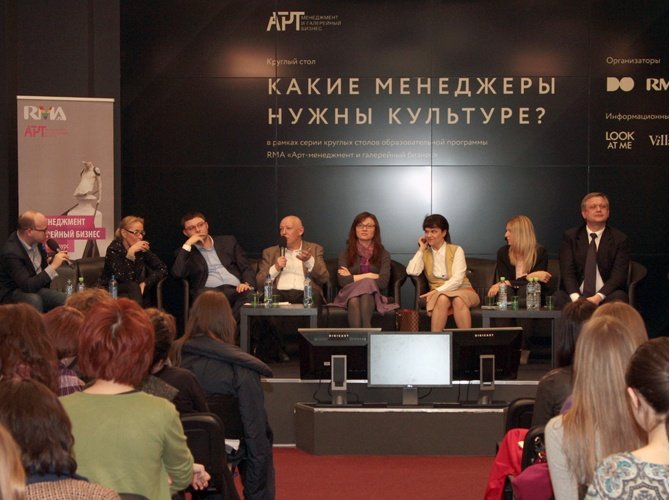News of faculty
«We are looking for the people with fresh ideas»
What an ideal art-manager should be like, and what kind of challenges he is most commonly facing in his professional duty? Which specific functions should he be performing? What is the difference between working on a commercial and non-profit projects? These and many other questions have been discussed in detail by the heads of the museums, top managers of the leading art-market institutions and representatives of the appropriate governmental departments during the round table titled «What kind of managers are needed to promote culture», that was organized by the educational company RMA «Art Management and Gallery Business» program in association with Digital October.

The participants of the discussion included the following: Joseph Buckstein (commissioner for the Moscow biannual Modern Arts festival), Catherine Vinnikova (executive director of RMA), Ilya Volf (general director of FineArtWay), Sergey Kapkov (head of the Moscow city department of culture), Marina Loshak (art director of the «Proun» gallery), Elena Panteleeva (director of the art-center «Vinzavod»), Olga Sviblova (director of Multimedia Art Museum), Vasiliy Tsereteli (executive director of Moscow Modern Art Museum) and Catherine Girshina (director of the educational summer-program of Strelki institute).
The host of the round table was a renowned art dealer and curator of the educational program «Art Management and Gallery Business» Nikolai Palazhchenko.
During the event a very particular interest was given to the speech done by «the manager of all managers of culture» Sergey Kapkov, who brought to the attention of participants the fact that presently the government is the number one employer for the managers in the area of culture:
«Historically it turned out that the government is now the owner of the large number of the culturally significant sites and facilities in the country, which are still the likely place for a creative and knowledgeable person with fresh outlook to go to work to. And we certainly do need more such people. We need those who are ready to work. And speaking of the modern art, it's market volume in Russia today unfortunately remains too insignificant. Now, being the manager and the curator are in fact quite different things. The greatest risk as I see it - is to fall into artificiality. One should either be a manager, or he should consider himself a curator. But the need of qualified managers yet remains much greater, as many of them are plagued by the lack of in depth knowledge. One can be familiar with the art, but not exactly be a professional in this area. Moreover, many young people want to take on projects by collaborating strictly with their equally popular Facebook peers as themselves. I find this approach fundamentally wrong. It is very important to know how to work with all categories of people, that is why I would be extremely hesitant to hire anyone who divides people into proverbial us and them. If you know how to do something well, the benefit of your knowledge should be shared equally among everybody».
At the closing of the discussion all participants have attempted to draw a portrait of an ideal manager of culture, that they themselves would most likely want to hire. The result showed that such person should be collected and focused, yet tolerant and opened to the outside world, and of course have a strong knowledge in the area of management.
Video recording of the round table can be viewed on the web site of Digital October.
